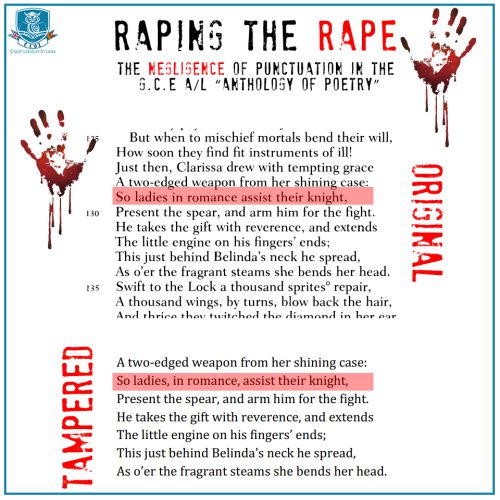Raping the Rape.
The Negligence of Punctuation in the G.C.E A/L “Anthology of Poetry” – A Critical Examination.
Introduction
Punctuation marks are the unsung heroes of the written word, guiding our reading and lending structure to our thoughts. In the realm of poetry, where each word is carefully chosen and every line is crafted with intention, the role of punctuation becomes even more crucial. However, it has come to light that the “Anthology of Poetry” provided by the Department of English at the National Institute of Education in Sri Lanka has displayed a blatant disregard for the importance of punctuation. This article aims to shed light on this issue and raise awareness about the dire negligence of the National Institute of Education.
The Tampering of Original Poems
One of the primary concerns with the G.C.E A/L ‘Anthology of Poetry’ is its careless tampering with original poems, where instances abound in which punctuation marks have been dropped or misplaced. This practise distorts the intended meaning and disrupts the poet’s carefully crafted rhythm and structure.
For example, let us consider John Donne’s renowned poem “Go and Catch a Falling Star.” In the original text, the fourth line of the second stanza reads, “Till age snow white hairs on thee,” with a comma marking the pause and connecting the clauses. Shockingly, the anthology presents it as, “Till age snow white hairs on thee.” completely eliminating the comma and replacing it with a full stop – disrupting the intended flow of the verse. Such disregard for punctuation not only compromises the poem’s intended meaning but also tarnishes the poet’s artistic expression.
In another instance, we can examine the 129th line of Canto Three in Alexander Pope’s “Rape of the Lock.” The original line, “So ladies in romance assist their knight,” possesses a natural rhythm and clarity. However, the anthology in question distorts it as, “So ladies, in romance, assist their knight.” This unnecessary addition of commas disrupts the line’s flow and distorts the poet’s intended emphasis. It is disheartening to witness such negligence towards the subtleties of poetic craft.
The Implications of Neglecting Punctuation in Poetry
Punctuation marks in poetry serve several critical functions. They establish rhythm, aid in the comprehension of complex ideas, and provide visual cues for the reader’s interpretation. By failing to pay attention to the original poems and their punctuation, the National Institute of Education undermines these essential elements of poetic artistry.
- Loss of Clarity
Punctuation marks help to separate and clarify ideas within a poem. Their omission or misplacement can create confusion and hinder the reader’s ability to grasp the intended meaning. This compromises the educational value of the anthology, as students are deprived of the opportunity to fully engage with and appreciate the poems. - Disruption of Rhythm
Punctuation marks play a vital role in establishing the rhythmic structure of a poem. Dropping or misplacing these marks disrupts the natural flow and musicality of the verse, diminishing the emotional impact that the poet intends to convey. Students are denied the chance to experience the true essence of the poems when they are presented in a distorted form. - Distorted Interpretation
Punctuation marks serve as guideposts for interpretation, allowing readers to navigate the poet’s intended emphasis, pauses, and tonal shifts. Altering or omitting these marks can lead to misinterpretation, altering the meaning and impact of the original work. Students are thus deprived of the opportunity to engage with the poems at a deeper level and develop their own critical understanding of the poet’s craft. - Loss of Poetic Devices
Punctuation marks serve as tools for employing various poetic devices such as enjambment, caesura, and parallelism. By ignoring or misplacing punctuation, the anthology robs students of the opportunity to study and appreciate these devices, limiting their understanding of poetic techniques and their ability to analyse and interpret poems effectively. - Diminished Aesthetic Value
Punctuation marks can contribute to the visual and aesthetic appeal of a poem on the page. They can be used creatively to create visual patterns, shapes, or unique arrangements. By neglecting proper punctuation, the anthology fails to showcase the full artistic vision of the poets, depriving students of the chance to appreciate the beauty and craftsmanship of the written word. - Disregard for Authorial Intent
Punctuation marks are a fundamental aspect of an author’s intent and contribute to the overall meaning and interpretation of a poem. Neglecting or altering punctuation disregards the poet’s original vision and compromises the integrity of the work. It is essential for students to engage with poems in their authentic form to fully grasp the intentions and messages of the poets. - Impaired Language Acquisition
Poetry, with its intricate use of language and syntax, serves as a valuable tool for language acquisition and development. By presenting poems with incorrect or missing punctuation, the anthology undermines students’ language learning experience. It hampers their exposure to grammatical conventions, syntactical structures, and the nuances of written expression, hindering their overall language proficiency. - Reproduction of Errors
The “Anthology of Poetry” acts as an authoritative resource for students studying English literature. By perpetuating errors in punctuation, it unintentionally reinforces incorrect grammar and punctuation practices among readers. This can have a cascading effect on future generations of students and their understanding of proper punctuation usage. - Missed Opportunities for Discussion
Punctuation in poetry can spark meaningful discussions about the poet’s choices and intentions. By neglecting this vital element, the anthology misses an opportunity to engage students in thought-provoking conversations about the significance of punctuation marks, their impact on the poem’s meaning, and the broader implications for literary analysis and interpretation. - Negative Influence on Writing Skills
Exposure to well-punctuated poetry can enhance students’ writing skills by providing them with examples of effective punctuation usage. The absence of proper punctuation in the anthology may inadvertently lead students to adopt poor punctuation habits in their own writing, undermining their ability to communicate clearly and effectively in written form.
Conclusion
The negligence displayed by the National Institute of Education in regard to punctuation marks in the “Anthology of Poetry” is disconcerting. By tampering with original poems and disregarding the importance of punctuation, the institution undermines the very essence of poetic artistry. It is essential that the institution recognise the importance of punctuation in poetry and take the necessary steps to rectify this oversight, allowing students to fully engage with and appreciate the rich world of poetic expression.

